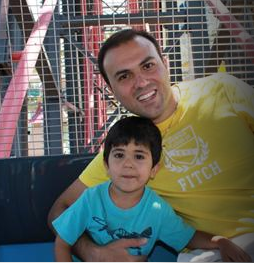 At the close of this year’s Easter, please enjoy this passage from Zechariah 12, prophesying Christ’s second coming. With so many in the world calling evil good and good evil, which has allowed the growth of the murderous terrorists, we need His return. Look for His return, and pray you are ready.
At the close of this year’s Easter, please enjoy this passage from Zechariah 12, prophesying Christ’s second coming. With so many in the world calling evil good and good evil, which has allowed the growth of the murderous terrorists, we need His return. Look for His return, and pray you are ready.
Zechariah 12:1-2, 9-11:
“A prophecy: The word of the Lord concerning Israel. The Lord, who stretches out the heavens, who lays the foundation of the earth, and who forms the human spirit within a person, declares: ‘I am going to make Jerusalem a cup that sends all the surrounding peoples reeling . . . . On that day I will set out to destroy all the nations that attack Jerusalem. And I will pour out on the house of David and the inhabitants of Jerusalem a spirit of grace and supplication. They will look on me, the one they have pierced, and they will mourn for him as one mourns for an only child, and grieve bitterly for him as one grieves for a firstborn son. On that day the weeping in Jerusalem will be as great as the weeping of Hadad Rimmon in the plain of Megiddo’.”
As Matthew Henry commented:
“It is a mourning grounded upon a sight of Christ: They shall look on me whom they have pierced, and shall mourn for him. Here, it is foretold that Christ should be pierced, and this scripture is quoted as that which was fulfilled when Christ’s side was pierced upon the cross; see John 19:37. He is spoken of as one whom we have pierced; it is spoken primarily of the Jews, who persecuted him to death (and we find that those who pierced him are distinguished from the other kindreds of the earth that shall wail because of him, Rev. 1:7); yet it is true of us all as sinners, we have pierced Christ, inasmuch as our sins were the cause of his death, for he was wounded for our transgressions, and they are the grief of his soul . . .”
Tragic Times of Persecution
I don’t go looking for evil acts, but my son brought to my attention a couple of attacks carried out by Muslims recently, that is, after the Brussels bombing. So I looked into them, and found some other things, too.
Today in Pakistan, 65 Easter celebrants were killed and about 300 injured.
A Muslim shopkeeper, a Mr. Shah, was murdered for wishing Christians and his country well at Easter time. He was apparently a very kind and humanitarian man, who sought understanding and good relations between Muslims and Christians. He therefore was killed. I very much disagree, however, with someone who left a note saying “Mr Shah, [a] true Muslim, thank you, from a Christian brother.” Christians follow Jesus Christ, who was nonviolent, taught against violence, and died after having performed healing miracles and leading a sinless life (including never having had sexual relations).
Muhammad, in contrast, killed many and had his men kill many (including those who had surrendered to his army and others who simply criticized him, even a woman poet); apparently this isn’t taught in schools. He did not perform miracles and he was polygamous. Muhammad represents Islam and therefore it’s reasonable that adherents would look to its founder and leader as the prime example in carrying out the faith. That’s what Christians do (or are supposed to be doing), so a good Muslim would do what Muhammad did. (And getting back to the Christian who called Mr. Shah “brother,” I wonder how John or Paul would react to calling a person “brother” who denied the resurrection and deity of Jesus? Perhaps Mr. Shah was in fact saved [God knows], but Muslims do not believe in Jesus; it makes for a very huge difference between the faiths. Brothers and sisters in the New Testament are fellow believers in Jesus Christ.)
Besides not seeming to know what Muhammad was like, the Muslims who are kind and caring don’t seem to know what the Koran and its important commentaries seem to say either. It’s like the experience of the Boston Bombers. The mother tells her older son that he needs to stop being so worldly and get into his faith more. When he does, he sees what the Koran says and what Muhammad did, and acts accordingly. The mother realizes her son is right and becomes “radicalized” too. The Judeo-Christian scriptures aren’t corrupt as Muslims think–as Muhammad made out–but promote love for all humans and faith in the creator God, so anyone who comes along later with a different message is obviously not of God. How much more bad fruit needs to fall for people to realize this?
Teacher Brutally Murdered by Afghan Migrant
Germany: Muslim Rape Crisis Worsens (from Gatestone Institute)








